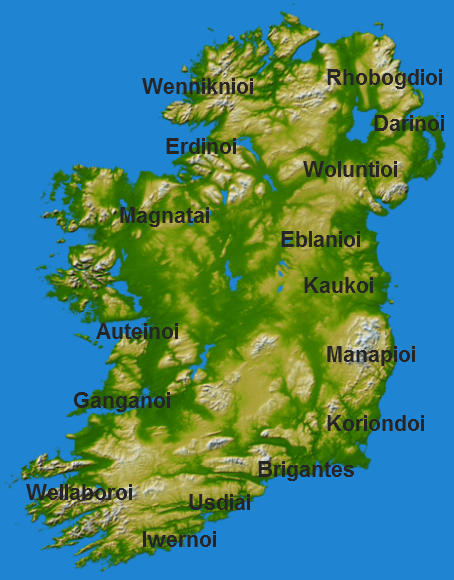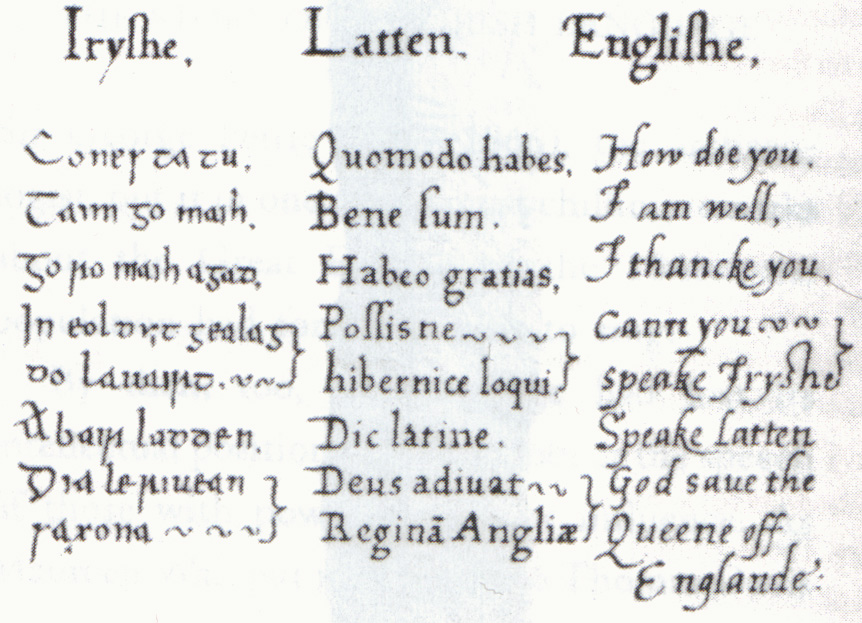|
Pádraig Ó HÉigeartaigh
Pádraig Ó hÉigeartaigh (1871–1936) was an Irish poet. Life Early life A native of Uíbh Ráthach, County Kerry, Ó hÉigeartaigh emigrated with his father, Patrick, a laborer, and his mother, Mary Lynch, to the United States when he was 12 years old and worked in a cotton factory. He lived his adult life in Springfield, Massachusetts. Family and Civic Life Ó hÉigeartaigh had 3 daughters and 4 sons with his wife, Catherine Ward. Two of his sons, Donncha and Diarmuid, were twins. He worked at the Charles F. Lynch Clothing Company for 30 years and then established his own clothing store. Ó hÉigeartaigh participated in many Irish organizations such as the Springfield branch of the Conradh na Gaeilge, established in 22 February 1897. His duties there included teaching and administrative work. He was also an active in the Ancient Order of Hibernians, the Springfield unit of the Army of the Republic, The American Association for the Recognition for the Irish Republic, t ... [...More Info...] [...Related Items...] OR: [Wikipedia] [Google] [Baidu] |
Gaels
The Gaels ( ; ga, Na Gaeil ; gd, Na Gàidheil ; gv, Ny Gaeil ) are an ethnolinguistic group native to Ireland, Scotland and the Isle of Man in the British Isles. They are associated with the Gaelic languages: a branch of the Celtic languages comprising Irish, Manx and Scottish Gaelic. Gaelic language and culture originated in Ireland, extending to Dál Riata in western Scotland. In antiquity, the Gaels traded with the Roman Empire and also raided Roman Britain. In the Middle Ages, Gaelic culture became dominant throughout the rest of Scotland and the Isle of Man. There was also some Gaelic settlement in Wales, as well as cultural influence through Celtic Christianity. In the Viking Age, small numbers of Vikings raided and settled in Gaelic lands, becoming the Norse-Gaels. In the 9th century, Dál Riata and Pictland merged to form the Gaelic Kingdom of Alba. Meanwhile, Gaelic Ireland was made up of several kingdoms, with a High King often claiming lordship over ... [...More Info...] [...Related Items...] OR: [Wikipedia] [Google] [Baidu] |
Irish Emigrants To The United States
Irish may refer to: Common meanings * Someone or something of, from, or related to: ** Ireland, an island situated off the north-western coast of continental Europe ***Éire, Irish language name for the isle ** Northern Ireland, a constituent unit of the United Kingdom of Great Britain and Northern Ireland ** Republic of Ireland, a sovereign state * Irish language, a Celtic Goidelic language of the Indo-European language family spoken in Ireland * Irish people, people of Irish ethnicity, people born in Ireland and people who hold Irish citizenship Places * Irish Creek (Kansas), a stream in Kansas * Irish Creek (South Dakota), a stream in South Dakota * Irish Lake, Watonwan County, Minnesota * Irish Sea, the body of water which separates the islands of Ireland and Great Britain People * Irish (surname), a list of people * William Irish, pseudonym of American writer Cornell Woolrich (1903–1968) * Irish Bob Murphy, Irish-American boxer Edwin Lee Conarty (1922–1961) * Irish McCal ... [...More Info...] [...Related Items...] OR: [Wikipedia] [Google] [Baidu] |
1936 Deaths
Events January–February * January 20 – George V of the United Kingdom and the British Dominions and Emperor of India, dies at his Sandringham Estate. The Prince of Wales succeeds to the throne of the United Kingdom as King Edward VIII. * January 28 – Britain's King George V state funeral takes place in London and Windsor. He is buried at St George's Chapel, Windsor Castle * February 4 – Radium E (bismuth-210) becomes the first radioactive element to be made synthetically. * February 6 – The IV Olympic Winter Games open in Garmisch-Partenkirchen, Germany. * February 10– 19 – Second Italo-Ethiopian War: Battle of Amba Aradam – Italian forces gain a decisive tactical victory, effectively neutralizing the army of the Ethiopian Empire. * February 16 – 1936 Spanish general election: The left-wing Popular Front coalition takes a majority. * February 26 – February 26 Incident (二・二六事件, ''Niniroku Jiken''): The I ... [...More Info...] [...Related Items...] OR: [Wikipedia] [Google] [Baidu] |
1871 Births
Events January–March * January 3 – Franco-Prussian War – Battle of Bapaume: Prussians win a strategic victory. * January 18 – Proclamation of the German Empire: The member states of the North German Confederation and the south German states, aside from Austria, unite into a single nation state, known as the German Empire. The King of Prussia is declared the first German Emperor as Wilhelm I of Germany, in the Hall of Mirrors at the Palace of Versailles. Constitution of the German Confederation comes into effect. It abolishes all restrictions on Jewish marriage, choice of occupation, place of residence, and property ownership, but exclusion from government employment and discrimination in social relations remain in effect. * January 21 – Giuseppe Garibaldi's group of French and Italian volunteer troops, in support of the French Third Republic, win a battle against the Prussians in the Battle of Dijon. * February 8 – 1871 French legislative election elect ... [...More Info...] [...Related Items...] OR: [Wikipedia] [Google] [Baidu] |
People From The Iveragh Peninsula
A person ( : people) is a being that has certain capacities or attributes such as reason, morality, consciousness or self-consciousness, and being a part of a culturally established form of social relations such as kinship, ownership of property, or legal responsibility. The defining features of personhood and, consequently, what makes a person count as a person, differ widely among cultures and contexts. In addition to the question of personhood, of what makes a being count as a person to begin with, there are further questions about personal identity and self: both about what makes any particular person that particular person instead of another, and about what makes a person at one time the same person as they were or will be at another time despite any intervening changes. The plural form " people" is often used to refer to an entire nation or ethnic group (as in "a people"), and this was the original meaning of the word; it subsequently acquired its use as a plural f ... [...More Info...] [...Related Items...] OR: [Wikipedia] [Google] [Baidu] |
Oxford University Press
Oxford University Press (OUP) is the university press of the University of Oxford. It is the largest university press in the world, and its printing history dates back to the 1480s. Having been officially granted the legal right to print books by decree in 1586, it is the second oldest university press after Cambridge University Press. It is a department of the University of Oxford and is governed by a group of 15 academics known as the Delegates of the Press, who are appointed by the vice-chancellor of the University of Oxford. The Delegates of the Press are led by the Secretary to the Delegates, who serves as OUP's chief executive and as its major representative on other university bodies. Oxford University Press has had a similar governance structure since the 17th century. The press is located on Walton Street, Oxford, opposite Somerville College, in the inner suburb of Jericho. For the last 500 years, OUP has primarily focused on the publication of pedagogical texts and ... [...More Info...] [...Related Items...] OR: [Wikipedia] [Google] [Baidu] |
Irish Language Outside Ireland
The Irish language originated in Ireland and has historically been the dominant language of the Irish people. They took it with them to a number of other countries, and in Scotland and the Isle of Man it gave rise to Scottish Gaelic and Manx, respectively. In the late 19th century, English became widespread in Ireland, but Irish-speakers had already shown their ability to deal with modern political and social changes through their own language at a time when emigration was strongest. Irish was the language that a large number of emigrants took with them from the 17th century (when large-scale emigration, forced or otherwise, became noticeable) to the 19th century, when emigration reached new levels. The Irish diaspora mainly settled in English-speaking countries, chiefly Britain and North America. In some instances the Irish language was retained for several generations. Argentina was the only non-English-speaking country to which the Irish went in large numbers, and those emigra ... [...More Info...] [...Related Items...] OR: [Wikipedia] [Google] [Baidu] |
Thomas Kinsella
Thomas Kinsella (4 May 192822 December 2021) was an Irish poet, translator, editor, and publisher. Born outside Dublin, Kinsella attended University College Dublin before entering the civil service. He began publishing poetry in the early 1950s and, around the same time, translated early Irish poetry into English. In the 1960s, he moved to the United States to teach English at universities including Temple University. Kinsella continued to publish steadily until the 2010s. Early life and work Thomas Kinsella was born on 4 May 1928 in Inchicore to Agnes (Casserly) and John Kinsella. He spent most of his childhood in the Kilmainham/Inchicore area of Dublin. He was educated at the Model School, Inchicore, where classes were taught in the Irish language, and at the O'Connell Schools in North Richmond Street, Dublin. His father and grandfather both worked in Guinness's brewery. He entered University College Dublin in 1946, initially to study science. After a few terms in college, he ... [...More Info...] [...Related Items...] OR: [Wikipedia] [Google] [Baidu] |
Irish Language
Irish ( Standard Irish: ), also known as Gaelic, is a Goidelic language of the Insular Celtic branch of the Celtic language family, which is a part of the Indo-European language family. Irish is indigenous to the island of Ireland and was the population's first language until the 19th century, when English gradually became dominant, particularly in the last decades of the century. Irish is still spoken as a first language in a small number of areas of certain counties such as Cork, Donegal, Galway, and Kerry, as well as smaller areas of counties Mayo, Meath, and Waterford. It is also spoken by a larger group of habitual but non-traditional speakers, mostly in urban areas where the majority are second-language speakers. Daily users in Ireland outside the education system number around 73,000 (1.5%), and the total number of persons (aged 3 and over) who claimed they could speak Irish in April 2016 was 1,761,420, representing 39.8% of respondents. For most of recorded ... [...More Info...] [...Related Items...] OR: [Wikipedia] [Google] [Baidu] |
Irish Poetry
Irish poetry is poetry written by poets from Ireland. It is mainly written in Irish language, Irish and English, though some is in Scottish Gaelic literature, Scottish Gaelic and some in Hiberno-Latin. The complex interplay between the two main traditions, and between both of them and other poetries in English and Scottish Gaelic literature, Scottish Gaelic, has produced a body of work that is both rich in variety and difficult to categorise. The earliest surviving poems in Irish date back to the 6th century, while the first known poems in English from Ireland date to the 14th century. Although there has always been some cross-fertilization between the two language traditions, an English-language poetry that had absorbed themes and models from Irish did not finally emerge until the 19th century. This culminated in the work of the poets of the Irish Literary Revival in the late 19th and early 20th century. Towards the last quarter of the 20th century, modern Irish poetry tended ... [...More Info...] [...Related Items...] OR: [Wikipedia] [Google] [Baidu] |


_(LOC)_-_Flickr_-_The_Library_of_Congress.jpg)
_1938.jpg)
.jpg)


